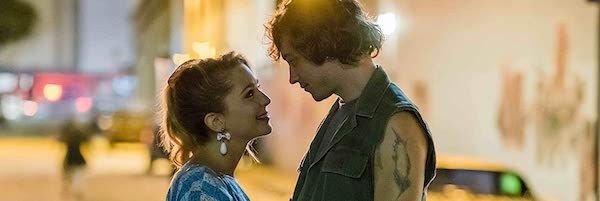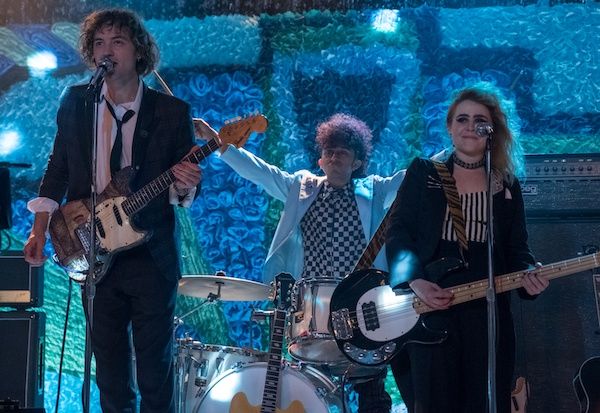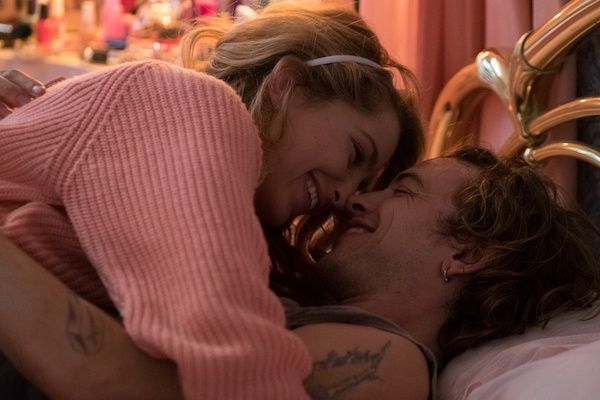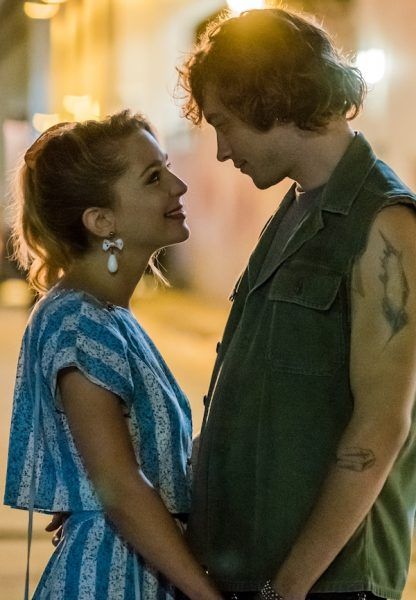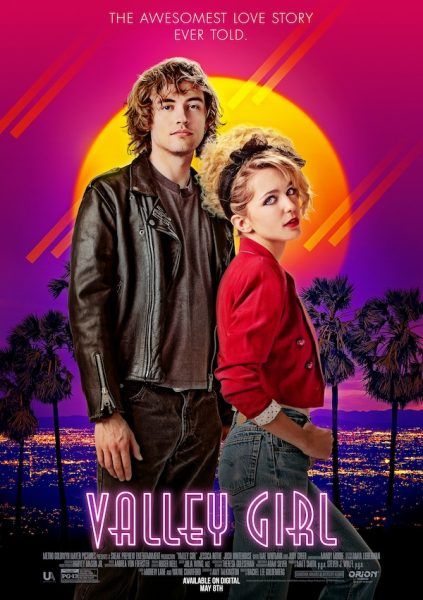Minor spoilers ahead for Valley Girl.
With a killer ‘80s soundtrack, the musical remake of Valley Girl follows high school senior Julie (Jessica Rothe), as she spends time with her BFFs at the mall and on the arm of her jock boyfriend (Logan Paul), all while dreaming about a life creating fashion designs. When she meets and falls for punk rock musician Randy (Joshua Whitehouse), even though he challenges everything she stands for, he also makes Julie realize that she needs to break out of the bubble that she’s been living in and follow her heart.
During the virtual press day for the film, Whitehouse spoke to Collider for this 1-on-1 phone interview about what he was most excited about with this character, learning about ‘80s music, portraying the emotion of the songs, the most fun and most challenging performance numbers to shoot, and how he feels about the style of the ‘80s. He also talked about the appeal of his next project Daisy Jones & The Six, and how he hopes they’ll start shooting before the end of this year, and what he’s been working on during quarantine.
COLLIDER: This movie is so much fun!
JOSH WHITEHOUSE: I’m really glad to hear that.
Obviously, when you make a big screen movie, it’s disappointing not to have audiences get to see it on the big screen, especially when it would have been a lot of fun to see this in a full theater. Are you just happy that people finally get to see this film?
WHITEHOUSE: Yeah, I’m really excited about it coming out. As demonstrated with The Knight Before Christmas, I don’t see a movie not coming out in the theater as a hugely big deal, in terms of gathering an audience. If anything, the fact that it will be out on digital will bring it to people’s eyes and ears much sooner. Hopefully, one day, it will still manage to get out and in theaters somewhere.
When this came your way, what were you most excited about with playing a character like this? Were there aspects of Randy you were excited about exploring, or was the musical aspect of Valley Girl the most appealing?
WHITEHOUSE: I think it was everything, really. The fact that it was a musical, being a musician myself, having the opportunity to play a musician is always exciting to me. But then, reading the script, Randy was a bit of a blank canvas, in terms of his mannerisms and his background. That gave me a lot of freedom and creativity, in deciding what those quirks were and the energy that he would hold on screen. So, that was really exciting to me. Also, the fact that I got to play, essentially, the odd one out in a movie is always appealing. The Valley Girl world was so shiny and crystal clear and joyous. Randy comes in and messes with things, and he disturbs the peace in a really beautiful way that turns out well for everybody, and they actually end up falling in love. That was a fun element for me to play with.
It’s also an interesting approach for a love story to tell the audience right from the beginning the couple at the center of the story doesn't stay together. How did you feel about that aspect of the storytelling?
WHITEHOUSE: In the same way Julie doesn’t change her style for Randy, but she changes for herself, this is a story of empowerment. She finds something out of her own curiosity, which she then goes on to follow against the views of her friends. They fall in love, but there’s a touch of reality in there in that it doesn’t always work out. He’s gone off to work on his music and continues to be himself, in the same way she was continuing to be herself in her exploration and growth in the story. At one point I thought, “Oh, they should stay together,” but I think the fact that they didn’t work is just as well.
Had you been aware of much ‘80s music, prior to doing Valley Girl, or did you have to school yourself on these songs?
WHITEHOUSE: I wasn’t hugely aware of tons of ‘80s music. There’s definitely some songs I was very aware of and already a fan of, but this film definitely enlightened me to a whole bunch of new music. We got a huge playlist, which [producer] Matt Smith put together for us, with maybe 600 songs from the ‘80s which I was listening to in the gym every day, ever since the day I was told I got the role. I fell in love with a lot of it and developed my own connection to it because of this film, so that was cool.
Are there challenges specific to doing a musical where you’re performing well known songs, as opposed to doing original songs?
WHITEHOUSE: It’s very different, in that sense. That was a huge barrier for me to work through. When I perform my own music, I’m singing the song along with the guitar. Whereas, in this experience, I had to sing the emotion. The words have to come from a feeling, as if you’re talking rather than it being just a performance song. So, there was definitely a lot for me to learn, in terms of how to portray that realistically on screen. The key with making a musical is knowing how to put the words across. That was a big learning curve.
Was there a number that was most fun for you to shoot, and was there one that was most challenging or most technical to do?
WHITEHOUSE: I think the most challenging was probably “You Might Think” by The Cars. That song had so much going on in it. I jump over the side of a wall, I slide down a rooftop, I jump off into the garden and do a flip, I run across cars, we do all of these lifts, and then we speed off into the night. There was so much happening in that particular song. That was definitely one of the most challenging. Probably one of my favorites was [A-ha's] “Take on Me.” Randy didn’t have so much choreography. Generally, he was jumping around and moshing, or playing a gig and doing music stuff, and so I had more of a chance to work with the choreographers for “Take on Me.” We worked on a carousel where we actually figured out a dance between the two characters. That was definitely one of my favorites to do.
How did you feel about the whole ‘80s style?
WHITEHOUSE: I love the ‘80s style. Randy was such a sore thumb in the mix. The whole film is so colorful. Everybody’s got these amazing ‘80s bits. Logan Paul pulling up in his polo tucked into his white shorts with his sneakers, and all of the girls with their ‘80s dancing garb on. I wished I got to dress up like that, but I was always in the same pair of jeans, the same pair of boots, and the same t-shirt. I didn’t quite get to experience wearing any of those ‘80s clothes, but I loved being surrounded by them. Everyone looked so cool.
At this point in your life and career, what do you look for on a project and what gets you excited about the work? Do you have your own personal wishlist, or is it more instinctual for you?
WHITEHOUSE: Generally, feeling I’m drawn to it is a big factor. I like characters you can get yourself lost within. I’m especially drawn to the weird and wonderful, as seen in The Knight Before Christmas, where I was playing such a different reality and it had comedic value. Something that really appeals to me is the ability to play somebody who’s going through something crazy. I’d love to play a wizard or someone who has superpowers. Stuff like that sounds really interesting. The magic of filmmaking is that you can make things that aren’t real, feel real. Whether that’s a drama and playing something very sombre, I still hold the same appreciation for it that I would The Knight Before Christmas, where I’m a time-traveling knight. The same magic could be had in any kind of story. It’s just whether that story appeals to you.
Did you shoot Daisy Jones & The Six before production was shut down, or is that something you hope you’ll still get to do sooner rather than later?
WHITEHOUSE: Oh, yeah, it’s still definitely happening. I’m living in Los Angeles at the moment, and I’m training to learn bass, every day. Over FaceTime, I have bass lessons. We’re working really hard on still continuing our prep. We were supposed to start shooting a couple weeks ago, but obviously the project’s been pushed until the quarantine is over. But as far as I’m aware, when the quarantine ends, we’re gonna get back in the studio. So, right now, I’m practicing and prepping, and then we’re gonna start filming sometime later this year.
What was the appeal of Daisy Jones & The Six for you?
WHITEHOUSE: Oh, man, everything about this project was interesting. It’s a really cool show with a really cool story. The fact that I get to play a musician again, it cut short a lot of my prep time because I’ve been prepping to be a musician my whole life. I feel like there isn’t so much to learn, in terms of attitude or feeling, or knowing how it feels to want to succeed in music, which gives me a lot more freedom to think about the reasons for my character choices and focus on the script. But then, once I actually got the job and I got to hear the music that we’re making for the show, Blake Mills, who’s been writing all the music, has done such a great job. The authenticity that they’re going for with this production, they want everybody to be able to actually perform the songs and for us to essentially be a real band. I think that is gonna bring a rare and interesting energy to the screen. And now, the cast that’s on board is so cool. I’m just really excited to be back with everybody.
What’s it been like to release music, do collaborations, shoot music videos, and try to do all of that while under quarantine?
WHITEHOUSE: It’s been a welcome activity, really. To have the time, in between working on Daisy Jones, to work on my music, as well, is very inspiring. I got to work on new songs and collaborations, and enjoying the ability to do that. I’ve also been spending my time, a little bit, looking into a project that I’ve just signed up to work towards, with UNDP, which is called Mission 1.5, which is a game that’s been designed to help kids and adults explain how climate change should be helped. I’ve actually been looking into that recently, as well. It gives you the opportunity to vote on what you think should be happening in the world, to help climate change. That will actually be present the world leaders, at the end, as well.
Valley Girl is now available on digital.

